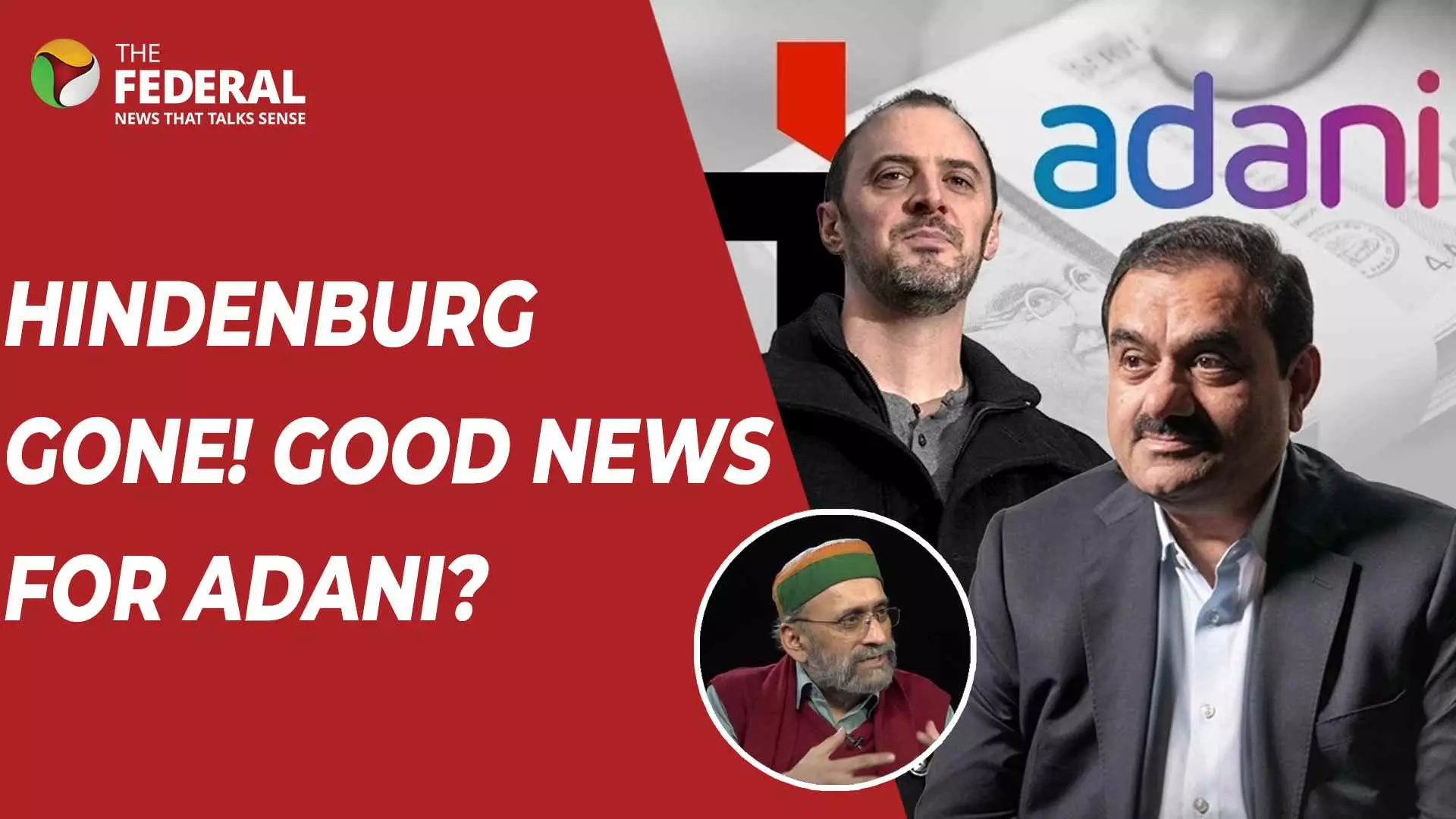
Interview with Paranjoy Guha Thakurta
Hindenburg’s shutdown | Paranjoy Guha explains its implications on Adani Group
He questions why, despite the serious allegations, Gautam Adani has not sued Hindenburg in a New York court, something he promised shortly after the report

The end of Hindenburg Research’s operations has sparked a wave of discussions, especially considering the company’s deep dives into corporate conglomerates like the Adani Group.
The timing is notable, with questions arising about whether this is linked to broader political events, including Donald Trump’s upcoming presidency. In an interview with The Federal, Paranjoy Guha Thakurta, a senior journalist, provides insights into the Hindenburg saga, its impact on global corporate practices, and the allegations against Adani.
Thakurta is also the only journalist against whom Adani’s lawyers have instituted six cases of defamation currently pending in different courts of law—five in Gujarat and one in Rajasthan.
A Long History of Corporate Exposures
Hindenburg Research is known for its investigative reports that exposed unethical practices within large companies. “Hindenburg Research, despite being a small team, made significant revelations,” says Thakurta, emphasising that the company’s work led to legal charges against over 100 individuals worldwide.
“This wasn’t just about the Adani group; many global companies have faced Hindenburg's scrutiny,” he adds. Companies like Nikola, Clover Health, and DraftKings were also part of Hindenburg's spotlight, with their stock values plummeting after allegations of fraudulent activities were made public.
Thakurta stresses that Hindenburg’s success lies in its forensic auditing approach, a method that looks deeply into corporate records to uncover hidden discrepancies. “They would investigate undisclosed transactions and illegal activities, something akin to investigative reporting,” he says.
The Hindenburg Name and Its Symbolism
The name “Hindenburg” itself carries significant weight. Named after the infamous German airship disaster of 1937, it symbolises monumental failure. Thakurta explains, "Nathan Anderson, the founder, chose the name to epitomise man-made corporate disasters." Hindenburg’s strategy has been to combine forensic investigation with short selling, a method that involves betting against companies based on their financial malpractices.
“Their model is legal in the US, though not in India entirely, but it has proven effective,” Thakurta remarks, referring to how Hindenburg’s financial model of betting on stock declines was part of what made their reports so influential.
Adani's Response and Alleged Political Linkages
The Adani Group’s response to Hindenburg's 2023 report was swift and dramatic. According to Thakurta, “The Adani group called it an attack on India itself, conflating the country’s interests with their corporate fortunes.” He compares the reactions of other companies Hindenburg exposed, noting a similar pattern: initial denials followed by investigations. “This is not unique to Adani. It happened with Nikola, it happened with other companies. Eventually, investigations followed,” Thakurta adds.
However, he questions why, despite the serious allegations, Gautam Adani has not sued Hindenburg in a New York court, something he promised shortly after the report. “It’s been almost two years, yet no lawsuit has been filed,” Thakurta points out, highlighting a discrepancy in the Adani Group’s actions.
The Role of Investigative Journalism
The larger narrative, according to Thakurta, revolves around the role of investigative journalism in holding powerful entities accountable. “Hindenburg and Nathan Anderson were doing the job of investigative reporters but with the added financial leverage of short selling,” he says. However, this model has led some to question the political motives behind Hindenburg’s findings, especially when the company announced it would shut down operations. Despite these concerns, Thakurta maintains, “They’ve operated transparently, and the investigations will continue, especially with the US Department of Justice and the Securities and Exchange Commission still involved.”
SEBI and Adani Investigations
Turning to India, Thakurta points out that the Securities and Exchange Board of India (SEBI) has concluded its investigation into the Adani-Hindenburg issue. However, there are still lingering questions about the regulatory body’s independence, particularly with regard to the conduct of its head, Madhabi Puri Buch. “She’s faced accusations of conflicts of interest, yet has not taken sufficient action to address these concerns,” Thakurta comments. He believes that this undermines the credibility of the regulator at a time when transparency is needed the most.
The Bigger Picture: Hindenburg's Legacy
Despite the closure of Hindenburg Research, Thakurta believes the ramifications of their findings will continue to reverberate. “Hindenburg’s work has stirred a global conversation about corporate accountability,” he concludes. “The Adani case is just the tip of the iceberg. There are much bigger stories to uncover.”
As for the future of investigations and the political undertones surrounding them, Thakurta emphasises that the narrative will persist. “This story is far from over. Whether Adani will face legal consequences remains to be seen, but the world is watching.”
The content above has been generated using a fine-tuned AI model. To ensure accuracy, quality, and editorial integrity, we employ a Human-In-The-Loop (HITL) process. While AI assists in creating the initial draft, our experienced editorial team carefully reviews, edits, and refines the content before publication. At The Federal, we combine the efficiency of AI with the expertise of human editors to deliver reliable and insightful journalism.


